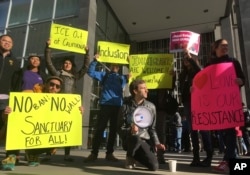Massachusetts' highest court ruled Monday it is against the law for local police officers to hold people based exclusively on their immigration status in order to give federal officials time to detain them.
The state's Supreme Judicial Court concluded in the case of Commonwealth v. Sreynuon Lunn that "nothing in the statutes or common law of Massachusetts authorizes court officers to make a civil arrest in these circumstances."
According to federal law, people who come to the United States legally and overstay their visas so that they are in the country unlawfully, have committed no crime. They are subject to civil penalties, not criminal ones. In addition, entering the U.S. illegally is a misdemeanor, or minor wrongdoing.
The ruling came after Sreynuon Lunn's lawyers filed an appeal on his behalf. Lunn came to the United States as a refugee when he was an infant in 1985 with his Cambodian parents, who were fleeing the Khmer Rouge.
Lunn, who is now in his 30s, was arrested Oct. 24, 2016, on a single count of unarmed robbery. The charge was eventually dismissed, but he continued to be held by court officers at the Boston Municipal Court at the request of a federal immigration hold, also known as a detainer.
Massachusetts law provides no authority for Massachusetts court officers to arrest and hold an individual solely on the basis of a federal civil immigration detainer, beyond the time that the individual would otherwise be entitled to be released from state custody, the Massachusetts Supreme Judicial Court ruling states.
The U.S. Immigration and Customs Enforcement (ICE) field office director in Boston, C.M. Cronen, said Monday in a statement that, "While ICE is currently reviewing this decision to determine next steps, this ruling weakens local law enforcement agencies' ability to protect their communities. The dedicated men and women of ICE will continue to do our sworn duty to enforce our immigration laws and protect the safety and security of the citizens of Massachusetts' communities."
Detainers
Over the years, ICE has issued requests that local law enforcement hold on to individuals if ICE believes they are subject to deportation.
The practice had local sheriff's departments across the country skeptical about the legality of these requests.
Sheriffs say holding someone on a detainer after they have completed their local or state custody is essentially a new arrest that must meet Fourth Amendment requirements.
But at least in Massachusetts, the practice of detaining a suspected undocumented immigrant for up to 48 hours after a criminal judge has ordered his or her release is now against the law.
Because the ruling was made by the state's supreme court, there is no higher authority to appeal to except the U.S. Supreme Court, which would not be applicable.
"No appeal to the U.S. Supreme because there is no federal question like constitutionality that is raised by the case," Texas immigration attorney Denise McGettrick told VOA.
Sanctuary cities
The Massachusetts state ruling comes on the heels of a ruling last week from a San Francisco federal judge that refused to reinstate a January executive order of President Donald Trump withdrawing federal funds from so-called sanctuary cities.
U.S. District Judge William Orrick III in San Francisco found that a memo from the Justice Department narrowing the scope of the executive order to a small number of federal grants and specific violations of immigration law was not grounds to reverse his own injunction against the order.
While government lawyers argued that the memo negated the need for the stay, the judge said it wasn't binding and could easily be reversed.
The lawsuit was brought by the city of San Francisco and Santa Clara County, which are sanctuary jurisdictions.
Sanctuary cities and counties generally decline to cooperate with federal immigration officials in rounding up illegal immigrants, including refusing to honor detainers.
In an interview with the Washington Examiner last week, ICE Acting Director Thomas Homan said he plans to send more resources and agents to sanctuary cities to crack down on illegal immigration.
The Trump administration says that local authorities endanger public safety when they decline to hand over illegal immigrants arrested for crimes.






